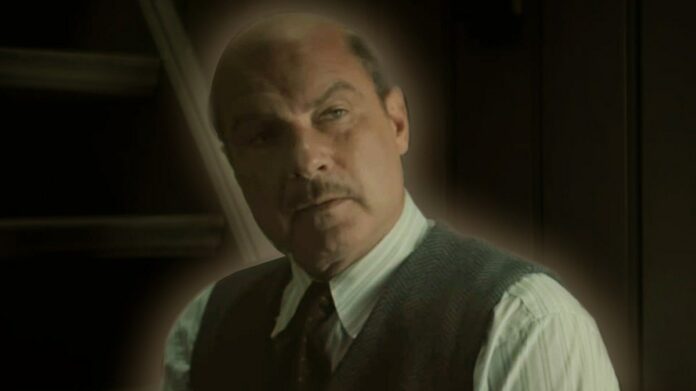Previously in A Small Light, episode 7, Gestapo officers stormed the office building of Opekta, holding Miep and the others at gunpoint. One of the Gestapo officers suspected the bookshelf was a door to a secret annex, leading to the Franks’ capture. Opekta’s manager, Mr. Kuglar, and another employee named Kleiman were detained, but they begged Miep to be released. Miep attempted to bribe a Viennese Gestapo officer but failed to secure the release of the Jews. The Franks and others were captured and taken away by the Nazis. Jan worried for Miep’s safety, and Kuno left their house. Miep and Jan devised a plan to bribe the Nazis with money to secure the release of the Franks, Pels, and Pfeffer.
Spoilers Ahead
Why Was There No Food In Amsterdam?
The final episode of A Small Light begins with Miep going to the Nazi council to negotiate for the release of the Franks and other captured families from the annex. She met with the Viennese Gestapo and offered him a bag full of cash as a bribe. The sight of the money made the Gestapo’s eyes sparkle momentarily, but he ultimately chose not to accept the bribe. He vehemently refused Miep’s request to release the Jews and refused to take the money. Undeterred, Miep approached another high-ranking Gestapo officer with the money. However, this officer was pure evil, as he took the money without any intention of helping her. He then ordered the security guards to forcefully remove Miep from the premises. They kicked her out, but Jan came to her rescue and took her back home. Meanwhile, the Nazis had cut off the food supply to Amsterdam, making it nearly impossible to obtain the necessary food. Miep attempted to sell pectin, but her sales worker refused to go door to door. Instead, she suggested that Miep sell the entire business and distribute the profits among the employees. In response to this offer, Miep fired her from Opekta.
However, Mr. Kleiman paid a visit to Miep and Bep in the office. He had been released from the hospital after being diagnosed with an ulcer. Unfortunately, Kugler was still under arrest, and the Franks and other families had been sent to various camps, making it impossible for Kleiman to maintain contact with them. Miep and Jan did their best to gather whatever food they could, but all Miep managed to find were tulip bulbs. She made soup from them, but it tasted awful. Suddenly, a loud sound of planes flying overhead compelled the Gies couple to come out of the house. They discovered that the Allies were dropping food supplies from the planes. Miep and Jan took a bite of the chocolate from the supplies and felt an overwhelming sense of relief.
Did Otto Frank Survive? What Happened To His Family?
Finally, the day of liberation arrived with the end of the war. Miep and Jan anxiously waited for the Franks, Pels, or Pfeffers to return. Kugler managed to escape from prison by hiding in a cornfield, a story he loved to repeat to everyone. Meanwhile, Jan attempted to reunite Frannie’s children with their grandmother, Mrs. Stopplebam. Unfortunately, the granddaughter, Liddy, passed away due to the refusal of a Nazi doctor to treat her because she was Jewish. Jan went to the railway station when the liberated Jews were returning to Amsterdam, but he couldn’t find any of the Franks, Pels, or anyone else he was hoping to see. However, he did find Max, who was alive and well. Jan hurried home after learning from Max that Otto was coming back. Otto Frank indeed returned, but he returned alone. While Otto, his wife, and the Van Pels family were in Auschwitz, the Frank sisters had been taken to Bergen-Belsen. Unfortunately, neither Edith nor any member of the Van Pels family survived. Bergen-Belsen was not an extermination camp, so Miep and everyone remained hopeful that Anne and Margot would return alive and healthy. They searched for their names among the lists of survivors, but their names were nowhere to be found.
Finally, Otto came across Peter Van Pels’ name in a list of deceased prisoners, which raised concerns about the fate of his daughters. One day, the most tragic news reached Otto. A former Jewish inmate from Bergen-Belsen visited Opekta to inform Otto that his daughters were no longer alive. Anne Frank and Margot had both succumbed to typhus in the camp. This devastating news not only shattered Otto but also deeply affected everyone in the office. However, Miep, gathering herself, took Anne’s diary, which she had left behind, and handed it to Otto. This diary became the only tangible connection Otto had to his daughter. Later, Otto read the diary and discovered a side of his daughter that she had never revealed to him before. He read each line of the diary, reliving the days when he was still with his family. Miep and Jan invited Otto to live with them, and he couldn’t refuse their offer. A Small Light concluded by providing an overview of what transpired afterward. Miep and Jan lived a happy married life together. Jan passed away at the age of 87 due to kidney failure, while Miep lived to the age of 100. Otto Frank became the sole surviving member of his family and went on to publish his daughter’s diary, which later gained worldwide recognition as a testament to hope and resilience.
Final Words
A Small Light ends with a testimonial to the human spirit’s resilience in the face of unfathomable hardship. Otto Frank’s endurance in the face of tragic loss, Miep and Jan’s unflinching commitment to helping people in need, and the ever-present impact of Anne Frank’s diary all serve as reminders of the courage and hope that can emerge from even the darkest of times. The narrative serves as a reminder of the power of kindness, empathy, and hope to inspire humanity and spark change.

